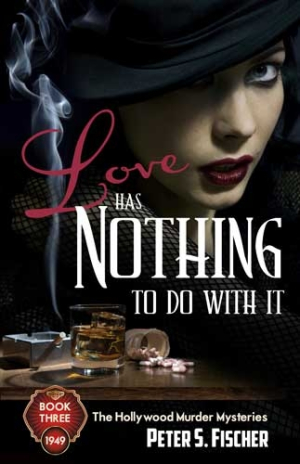
Love Has Nothing to Do with It
The Hollywood Murder Mysteries Book Three
It’s 1949, on a Hollywood movie set where a fictionalized James Cagney is acting in White Heat, a dark gangster film from Warner Brothers. A glamorous setting, to be sure, but studio publicist Joe Bernardi sees the nitty-gritty that goes on behind the scenes. In this third installment of Peter S. Fischer’s Hollywood Murder Mysteries series, Bernardi finds himself intimately involved in a homicide case when his ex-wife is accused of shooting a movie mogul.
Fischer is no newcomer to the mystery genre. Best-known for cocreating and writing for the popular television series Murder, She Wrote, for which he received three Emmy nominations, Fischer has been honored with an Edgar Award from the Mystery Writers of America. Readers may recognize his name from the credits of television shows like Kojak, MacMillan & Wife, and Ellery Queen.
Fischer’s experience shows in Love Has Nothing to Do With It, an homage to film noir and the hard-boiled detective novel. The story is complicated—Bernardi’s ex-wife is in jail for murdering her former lover, Tyler Banks, who leaves behind a long list of disgruntled acquaintances that includes Bernardi himself—but Fischer never loses the thread. The story is intricate enough to be intriguing but not baffling.
Bernardi’s matter-of-fact voice borrows its attitude of cool observation from classic first-person narrators like Dashiell Hammett’s Sam Spade. He offers opinions on the usual suspects: the jealous husband, the corrupt cop, and several femmes fatales. Sometimes, Fischer reaches a bit in his attempt to capture the hard-boiled narrator’s voice, as when Bernardi says Banks has been “hanging around … like a lace mantilla on a Mexican grandmother.” At other times, Bernardi’s swagger is authentic and entertaining. Overall, he is a likeable sleuth, with the dogged determination to uncover the truth.
None of the characters is drawn in depth, but readers will recognize and remember everyone, from alcoholic ex-wife Lydia to cagey real-estate magnate Sean Flaherty and shady former business partner Jake Pepper. They all have reasons to want Tyler Banks gone, and the real culprit only becomes clear at the very end. Fischer keeps the tension alive by not going full bore on every page. Instead, he inserts occasional scenes of comic relief that keep the reader off-balance and ensure that each revelation will be a surprise.
Period details lend an authenticity to the setting. In one scene, a jukebox plays Frankie Lane songs, and in another Dinah Shore sings on the radio. Bernardi is offended by the high price of parking in Burbank—25 cents—which adds to the nostalgic feeling. Fischer knows the era well, as evidenced by earlier titles in the Hollywood series like We Don’t Need No Stinking Badges and Jezebel in Blue Satin, set in 1947 and 1948, respectively.
While the outcome of the Tyler Banks murder is an unknown until the final pages of the current title, we do know that Joe Bernardi will survive at least until 1950, when further adventures await him in the forthcoming Everybody Wants an Oscar.
Reviewed by
Sheila M. Trask
Disclosure: This article is not an endorsement, but a review. The publisher of this book provided free copies of the book and paid a small fee to have their book reviewed by a professional reviewer. Foreword Reviews and Clarion Reviews make no guarantee that the publisher will receive a positive review. Foreword Magazine, Inc. is disclosing this in accordance with the Federal Trade Commission’s 16 CFR, Part 255.
